#arnold reich
Explore tagged Tumblr posts
Text

This is one of my favorite photos from history.....
U.S. Army Chaplain Manuel Poliakoff (center) assisted by PFC Arnold Reich and Corporal Martin Willen celebrating Purim in March of 1945 at the former home of German Propaganda Minister Joseph Goebbels (without permission, of course). Goebbels's house was taken over so quickly that the trappings of Nazism had not yet been taken down. This photograph was published in Yank Magazine, but it's not known if Goebbels (or his boss) ever saw it or heard about it. Three weeks later it happened again, as Jewish GIs packed the house once more, this time to celebrate Passover. Purim is an ancient Hebrew holiday commemorating the salvation of the Jewish people from a ruler who schemed to kill all the Jews in the Persian Empire.
Historia Obscurum
142 notes
·
View notes
Text
The crisis of the world - 1933 and 2023
Thomas Weber
Memorise content
What does 1933 teach us? If we understand National Socialism as a form of illiberal democracy, we can see that today's variants could easily slide into something worse. Then as now, exaggerated perceptions of crisis play an important role.
In times when several major crises are brewing into what is perceived as an existential poly-crisis, fears of the political consequences of this perception spread. The most spectacular case of the collapse of a democracy - the collapse of the Weimar Republic in January 1933 - is therefore repeatedly scrutinised in the hope of discovering lessons for the present.
A prime example of this in recent years is what has been happening in the United States: since the New York Times columnist Roger Cohen greeted his readers with "Welcome to Weimar America" in December 2015, "Weimerica" has developed into a veritable genre of opinion pieces and books. After the attack on the Capitol in Washington in January 2021, the son of an Austrian SA man also used his fame as a Hollywood actor and former governor of the US state of California to record a video message to the world: In it, Arnold Schwarzenegger spoke about his father and drew direct comparisons between the Reichspogromnacht, the Nazi anti-Jewish pogrom of 9 November 1938, and the situation in the US in early 2021. to resolve the footnote[3]
It is therefore not surprising that Adolf Hitler is more dominant in public discourse today than he was a generation ago. Between 1995 and 2018, the frequency with which Hitler was mentioned in English-language books rose by an astonishing 55 per cent. In Spanish-language books, the frequency even increased by more than 210 per cent in the same period. To break up the footnote[4] This increase is a result of both a growing perception of crisis and another phenomenon: an awareness of how much the world we live in today can be traced back directly and indirectly to the horrors of the "Third Reich" and the Second World War.
But the world that emerged in 1933 is not invoked everywhere in order to understand and interpret today's situation. Strangely enough, one country in the heart of Europe has taken a different direction: Germany itself. Here, the frequency with which Hitler was mentioned in books fell by more than two thirds between 1995 and 2018. The same trend applies to other terms that refer to the darkest chapter of Germany's past, such as "National Socialism" and "Auschwitz". To resolve the footnote[5] However, a declining interest in National Socialism should not lead to the false assumption that today's Germany is less strongly characterised by the legacy of the "Third Reich" and the horror that the Germans spread throughout Europe. The legacy of National Socialism defines who the Germans are, and has done so since the day Hitler was appointed Reich Chancellor in January 1933.
New "special path"
In Germany, there was probably not so much explicit publicity about National Socialism because it was believed that the country had learnt from the past and built an exemplary political system with a corresponding society that had internalised the lessons of National Socialism. The prevailing narrative of the early Berlin Republic was that Germany had taken a "special path" towards dictatorship and genocide in the 19th and early 20th centuries. With reunification in 1990, however, the country had finally left this path and had fully arrived in the West. To resolve the footnote[6] According to this interpretation, the Berlin Republic was a new player in international politics, working side by side with its partners in Europe and the world to secure peace and stability at home and abroad.
However, the varying frequency with which Hitler, Auschwitz and National Socialism are referred to in books in Germany and abroad shows that Germany did not abandon its special path in 1990, but rather embarked on a new one. Germany's actual special path is that of its second (post-war) republic, which was founded in 1990 and, if one follows the argumentation of journalist and historian Nils Minkmar, collapsed in the wake of Putin's war of aggression against Ukraine. Germany's second republic, writes Minkmar, "took a holiday from history, was finally able to enjoy the moment like Faust and, also like Faust, made a pact - with Putin and with bad consequences". To resolve the footnote[7] However, Germany's holiday from history came to an abrupt end with the Russian invasion of Ukraine on 24 February 2022. In the words of Federal Chancellor Olaf Scholz: "24 February 2022 marks a turning point in the history of our continent." To resolve the footnote[8] Scholz is right when he speaks of a turning point, but it does not primarily concern "our continent", but first and foremost his own country. The Russian invasion of Ukraine made many Germans suddenly aware of the realities of international politics that had been present to Germany's neighbours for some time.
The Faustian pact was not born of malice - Germany's second republic had been founded and governed with the best of intentions. Rather, a certain short-sightedness had prevailed that prevented many Germans from seeing what many of their international partners had long recognised after Russia's previous invasions or the shooting down of MH17 - the Malaysia Airlines plane that was shot down by a Russian missile in Ukrainian airspace on its way from Amsterdam to Kuala Lumpur in July 2014. And this short-sightedness is closely linked to the normative conclusions that the protagonists of the Second German Republic had drawn from the country's experience with National Socialism, which differed quite drastically from those drawn by other countries.
As a result, many Germans relied on soft power and had little interest in hard power - without realising that the former is just hot air if it is not accompanied by the latter. At the same time, many failed to recognise that Putin's aggressive approach since the day he took office was in line with earlier phases of Russian history. This is also reflected in a sharp decline in references in German-language publications to terms associated with the dark side of Russia's past, such as "Gulag", "Stalin", "Prague Spring" or "popular uprising". Dissolving the footnote[9] In English-language books, the number of mentions of the terms "Stalin" and "Prague Spring" remained relatively constant between 1995 and 2018, while mentions of the "Gulag" actually increased significantly. Resolution of the footnote[10]
The illusions that were harboured in Germany ultimately stood in the way of both even more successful European integration and the creation of an even more durable security and peace architecture. Minkmar therefore believes that a third republic must emerge from the ruins of the second: one that takes a less short-sighted view of the world around it and leaves behind the "naivety" of thinking about the world. To resolve the footnote[11] It is therefore necessary to work out lessons from the "Third Reich" for the third republic.
Historical misunderstandings
However, the myopic view of the past is not limited to Germany. In fact, many of the lessons learnt worldwide from 1933 for crisis management in the 2020s are based on historical misunderstandings. For example, although there are countless books about the "Third Reich" and its horrors, in many cases, and without realising it, they reproduce clichés dating back to Nazi propaganda minister Joseph Goebbels, or they portray Hitler and the National Socialists only as madmen driven by hatred, racism and anti-Semitism. However, such approaches will never understand why so many supporters of National Socialism saw themselves as idealists. And they will not be able to explain why, according to Hitler, reason, not emotion, should determine the actions of National Socialism. On the resolution of the footnote[12]
A reductionist approach to the question of what characterised Hitler and other National Socialists is dangerous. It tempts us to look for false warning signs in today's world and to search for Hitler revenants and National Socialists in the wrong places. We are therefore recommended to read Thomas Mann's essay "Brother Hitler" from 1938, in which he portrays the dictator as a product of the same traditions in which he himself had grown up. In doing so, he opens our eyes to the realisation that it is not the angry crybabies, but above all people "like us" who are open to dismantling democracy in times of crisis. In fact, as soon as we take the ideas of the National Socialists seriously, it becomes disturbingly clear that many people supported these policies in the period from the 1920s to the 1940s for almost the same reasons that we so vehemently reject National Socialism today - not least the conviction that political legitimacy should come from the people and that equality is an ideal worth fighting for.
It is therefore important to dispel various misconceptions about the death of democracy in 1933 that are still taught in German schools today, including the idea that the seeds of Weimar's self-destruction were sown as early as 1919, that the "unstable Weimar constitution (.... ) ultimately led to the self-dissolution of the first German democracy", that "coalitions capable of governing [became] impossible because there were too many splinter parties", On the dissolution of the footnote[13] that the rise of Hitler resulted from the strength of the German conservatives, that the world economic crisis played the decisive role in the death of German democracy, that Germans supported the National Socialists, because they longed for the return of the authoritarian state of the past and rejected democracy in any form, or that the actions of the National Socialists did little to bring Hitler to power - which is evident, for example, in the tendency to speak only of a "transfer of power" in relation to the events of 1933 and not of a process that was both a "transfer of power" and a "seizure of power". On the resolution of the footnote[14]
The beliefs of the National Socialists and the appeal of their ideas cannot be understood if we do not take seriously the central apparent contradictions at the core of National Socialism, namely that the National Socialists destroyed democracy and socialism in the name of overcoming an all-encompassing, existential mega-crisis and creating a supposedly better and truer democracy and socialism. The National Socialists preached that all power must come from the people, not out of insincere and opportunistic Machiavellianism, but because they believed it. The promise of a National Socialist illiberal "people's community democracy" as a collectivist and marginalising concept of self-determination was widely accepted and promised to overcome what was supposedly the greatest crisis in centuries. This made 1933 possible and ultimately brought the world to the gates of hell.
So if we understand National Socialism as a manifestation of illiberal democracy, we see that today's variants of illiberal democracy could very easily slide into something much worse in times of crisis than we are currently experiencing in many places around the world. If we refrain from a reductionist account of National Socialism, we will recognise that the parallels between the present and the past lie primarily in the dangers posed by illiberal democracy and the general perception of crisis.
Furthermore, if we understand National Socialism as a political religion, we can understand why Germans followed its siren song en masse. Hitler's political religion demanded a double commitment from converts: firstly, to National Socialist orthodoxy - adherence to 'correct' beliefs and the practice of rituals - and secondly, to National Socialist orthopraxy - the 'ethical' behaviour prescribed by orthodoxy. In this way, acts of violence and war against internal and external "enemies of the people" were given a moral and even heroic significance - because they supposedly served a "higher" purpose, the good of one's own "national community". The belief systems of National Socialism are therefore inextricably linked to the violence and horrors of the "Third Reich". In other words, while it may well be true that liberal democracy brings with it a "peace dividend", illiberal democracy - at least in its totalitarian, messianic incarnations - can easily generate a "genocide and war dividend" if people believe they can overcome an existential crisis in this way.
Just as the National Socialist mindset should be taken seriously as a key driver of violent and extreme behaviour, the National Socialists themselves should also be understood as political actors with a clear plan for the future. Although it often looked as if they were merely reacting to others, it was precisely this reactive character of National Socialist behaviour that was a tactic - and a very successful one at that - that explains not only the developments in 1933, but also the dynamics of twelve years of Nazi rule. The path from the seizure of power to the settlement policy in the East, to total war and to a war policy of extermination and genocide was by no means long and tortuous - in the self-perception of its actors, it was the path to overcoming an existential polycrisis.
What does 1933 teach us?
The way in which the National Socialists succeeded in seizing and consolidating power and ultimately pursuing radical policies has more in common with the cunning of Frank Underwood, the fictional US president from the Netflix series "House of Cards", than with many of the portrayals that question whether their rise was coolly calculated. The political style and the illusion game of the National Socialists, the undermining and destruction of norms and institutions as well as the pursuit of a hidden agenda are increasingly becoming characteristics of politics in our time as well. Understanding the year 1933 should therefore help us to better understand today's challenges.
We therefore need a defensive democracy with strong guard rails in order to be able to counter the perception of an existential polycrisis. This includes strong party-political organisations that - unlike in daydreams of the transformation of parties into "movements" - prevent the internal takeover by radicals. Crucially, strong party structures also provide a toolkit to deal with polarised societies by both representing and containing divisions. The behaviour of conservative parties is particularly important here. German conservatism played a central role in the fall of Weimar democracy, but in a counter-intuitive way, not through its strength but through its weakness and the fragmentation of its organisations.
However, guard rails offer little or no protection if they are poorly positioned. Thus, a look beyond Germany reveals that in trying to make our own democracy weatherproof and crisis-resistant, we may have more to learn from cases where democracy survived in 1933 than from the death of democracy in Germany. The Netherlands, for example, had established a resilient political structure, or a defencible democracy avant la lettre, capable of dealing with a wide range of shocks to its system and responding flexibly to crises. As a result, the Dutch did not need to anticipate the specific threats of 1933, as their crisis prevention and response capacities were large enough to avoid the establishment of a domestic dictatorship. The comparison also shows that some supposed guard rails of today's democracy in Germany - such as the five per cent hurdle in elections - are largely useless and only appear to offer security.
The problem of looking at specific cases of the collapse of democracy, including the German case in 1933, harbours a danger: that the most important variables are insufficiently recognised and too narrow conclusions are drawn. The exact historical context of the collapse of a political order will always vary, as will the perception of an existential polycrisis and its political consequences. It therefore makes sense to identify states and societies from the past that were resilient to the widest possible range of shocks. Or as historian Niall Ferguson puts it: "All we can learn from history is how to build social and political structures that are at least resilient and at best antifragile (...), and how to resist the siren voices that propose totalitarian rule or world government as necessary for the protection of our unfortunate species and our vulnerable world." To resolve the footnote[15]
Nevertheless, the fall of the Weimar Republic in 1933 is a warning of where uncontained perceptions of crisis can lead. After all, it was Hitler's polycrisis consciousness and the associated individual and collective existential fear that formed the core of the emergence of Hitler's political and genocidal anti-Semitism. Added to this was the identification of the Jews with this crisis and the implementation of this identification in a programme of total solutions in order to "protect" themselves permanently. To resolve the footnote[16]
Perhaps the most important warning that the past century holds for us is that the biggest and most terrible crises in the world only arise when we try to contain real or perceived crises headlessly and without moderation. To resolve the footnote[17]
This article is a revised extract from Thomas Weber (ed.), Als die Demokratie starb. Die Machtergreifung der Nationalsozialisten - Geschichte und Gegenwart, Freiburg/Br. 2022.
Footnotes
On the mention of the footnote [1]
Roger Cohen, Trump's Weimar America, 14 Dec 2015, External link:http://www.nytimes.com/2015/12/15/opinion/weimar-america.html.
For the mention of the footnote [2]
Niall Ferguson, "Weimar America"? The Trump Show Is No Cabaret, 6 Sept. 2020, External link:http://www.washingtonpost.com/business/weimar-america-the-trump-show-is-no-cabaret/2020/09/06/adbb62ca-f041-11ea-8025-5d3489768ac8_story.html.
On the mention of the footnote [3]
Cf. Thomas Weber, Trump Is Not a Fascist. But That Didn't Make Him Any Less Dangerous to Our Democracy, 24.1.2021, external link:https://edition.cnn.com/2021/01/24/opinions/trump-fascism-misguided-comparison-weber/index.html.
On the mention of the footnote [4]
Cf. Google N-gram analyses for "Hitler" and "Auschwitz" in English and Spanish, created on 10 August 2022: External link:https://t1p.de/ngramspanish and External link:https://t1p.de/ngramenglish.
For the mention of the footnote [5]
Cf. Google N-gram analyses for "Hitler", "Auschwitz" and "National Socialism" in German, created on 10 January 2022: External link:https://t1p.de/ngramgerman.
On the mention of the footnote [6]
Cf. Heidi Tworek/Thomas Weber, Das Märchen vom Schicksalstag, 8 November 2014, External link:http://www.faz.net/13253194.html.
On the mention of the footnote [7]
Nils Minkmar, Long live the Third Republic, 10 May 2022, External link:http://www.sueddeutsche.de/projekte/artikel/kultur/e195647.
Mention of the footnote [8]
Government statement by Federal Chancellor Olaf Scholz, 27 February 2022, External link:http://www.bundesregierung.de/breg-de/suche/regierungserklaerung-von-bundeskanzler-olaf-scholz-am-27-februar-2022-2008356.
Mention of the footnote [9]
Cf. Google N-gram analyses for "Stalin", "Gulag", "Prager Frühling" and "Volksaufstand" in German, created on 10 August 2022: External link:https://t1p.de/ngramstalingerman and External link:https://t1p.de/ngramgulagpfvgerman.
For the mention of the footnote [10]
Cf. Google N-gram analyses for "Stalin", "Gulag" and "Prague Spring" in English, created on 10 August 2022: External link:https://t1p.de/ngramstalinenglish and External link:https://t1p.de/ngramgulagpsenglish.
On the mention of the footnote [11]
See Minkmar (note 7).
On the mention of the footnote [12]
In his first known written anti-Semitic statement - the so-called Gemlich letter of 1919 - Hitler rejected "anti-Semitism on purely emotional grounds" and advocated an "anti-Semitism of reason". Cf. Hitler to Adolf Gemlich, 16 September 1919, reproduced in: German Historical Institute Washington DC, German History in Documents and Images, n.d., external link:https://germanhistorydocs.ghi-dc.org/pdf/deu/NAZI_HITLER_ANTISEMITISM1_DEU.pdf.
On the mention of the footnote [13]
Cf. Fabio Schwabe, Gründe für das Scheitern der Weimarer Republik, 12 March 2021, external link:http://www.geschichte-abitur.de/weimarer-republik/gruende-fuer-das-scheitern.
On the mention of the footnote [14]
Cf. Hans-Jürgen Lendzian (ed.), Zeiten und Menschen. Geschichte, Qualifikationsphase Oberstufe Nordrhein-Westfalen, Braunschweig 2019, pp. 237-264; Ulrich Baumgärtner et al. (eds.), Horizonte. Geschichte Qualifikationsphase, Sekundarstufe II Nordrhein-Westfalen, Braunschweig 2015, pp. 242-270.
On the mention of the footnote [15]
Niall Ferguson, Doom. The Politics of Catastrophe, London 2022, p. 17, own translation.
On the mention of the footnote [16]
Cf. Thomas Weber, Germany in Crisis. Hitler's Antisemitism as a Function of Existential Anxiety and a Quest for Sustainable Security, in: Antisemitism Studies (n.d.).
On the mention of the footnote [17]
Cf. Beatrice de Graaf, Crisis!, Amsterdam 2022.
#Creative Commons Licence#CC BY-NC-ND 3.0 DE#Thomas Weber#bpb.de#Germany 1933#weimar#weimar America#stop violence#stop trump#save our democracy#vote democrat#vote blue#please vote#Weimerica#Roger Cohen#read more
10 notes
·
View notes
Text
every album i listened to this year pt. 1
i listened to 238 albums that were new to me this year. this is the first 119 of them + basic genre tagging.
A Sunny Day In Glasgow - Sea When Absent [noise pop]
ABBA - Volume 25 [karaoke]
Agriculture - Agriculture [black metal]
Agriculture - The Circle Chant [black metal]
Alcest - Écailles de Lune [black metal]
Altar of Plagues - White Tomb [black metal]
Animals as Leaders - Parrhesia [djent]
Another Heaven - 1: You Are Loved [shoegaze]
Art Sorority - Older Boys [folk punk]
Ashenspire - Hostile Architecture [black metal]
Atomic Guava - Peasants of the Future [power metal]
awakebutstillinbed - chaos takes the wheel and i am a passenger [emo]
Bad Religion - New Maps of Hell [punk]
bar italia - Tracey Denim [post-punk]
Basketball Divorce Court - rebound [punk]
Big Black - Atomizer [noise rock]
Big Thief - Dragon New Warm Mountain I Believe In You [alt-country]
Black Ends - Stay Evil [noise pop]
Black Math Horseman - Black Math Horseman [black metal]
Blanky - Blood Harmony [alternative]
Bosse-de-Nage - Bosse-de-Nage [black metal]
Bosse-de-Nage - ii [black metal]
Bosse-de-Nage - iii [black metal]
Bosse-de-Nage/Deafheaven - Split EP [black metal]
boybrain - In The Company of Worms [punk]
Bríi - Último Ancestral Comum [rock]
Cable Ties - All Her Plans [punk]
Callous Daoboys - Celebrity Therapist [hardcore]
Charlie Megira - Da Abtomatic Meisterzinger Mambo Chic [lo-fi]
Chat Pile - God’s Country [sludge metal]
Chat Pile - Remove Your Skin Please [sludge metal]
Chat Pile - This Dungeon Earth [sludge metal]
Chat Pile & Nerver - Brothers in Christ [sludge metal]
Cherub Tree - where are your manners [alternative]
Choncy - Community Chest [post-punk]
Corker - Falser Truths [post-punk]
Crime of Passing - Crime of Passing [post-punk]
Dark Factory - Dark Factory [new wave]
Days ‘N Daze - Rogue Taxidermy [folk punk]
Days ‘N Daze - Songs We Recorded for Splits [folk punk]
Dazy - OTHERBODY [alternative]
Deafheaven - New Bermuda [blackgaze]
Deafheaven - Sunbather [blackgaze]
Deeper - Careful! [post-punk]
Dirty Old Town - No Returning Home [alternative]
Dummy - Mandatory Enjoyment [post-punk]
dust - et cetera, etc [punk]
Eddy Arnold - Cattle Call [country]
Ekko Astral - Quartz [punk]
Ekko Astral - The Quartz Farewell [punk]
Elizabeth Colour Wheel - Nocebo [black metal]
Erik Hall - Canto Ostinato (Simeon ten Holt) [neo-classical]
Erik Hall - Music For 18 Musicians (Steve Reich) [neo-classical]
Explosions in the Sky - All of a Sudden, I Miss Everyone [post-rock]
Explosions in the Sky - How Strange, Innocence [post-rock]
Ezra Furman - All of Us Flames [art rock]
Ezra Furman - Perpetual Motion People [art rock]
Ezra Furman - Transangelic Exodus [art rock]
Ezra Furman - Twelve Nudes [art rock]
Feeble Little Horse - Girl with Fish [shoegaze]
Fela Kuti - Beasts of No Nation [afrobeat]
Fela Kuti - Coffin for Head of State [afrobeat]
Fela Kuti - Expensive Shit [afrobeat]
Fela Kuti - Roforofo Fight [afrobeat]
Fela Kuti - Zombie! [afrobeat]
Feminazgûl - The Age of Men is Over [black metal]
Frail Body - A Brief Memoriam [hardcore]
Fucked Up - Dose Your Dreams [hardcore]
GEL - Only Constant [hardcore]
Genital Shame - Gathering My Wits [alternative]
Gilla Band - Live at Vicar Street [noise rock]
Godcaster - Godcaster [psychedelic rock]
Hatchie - Giving the World Away [dream pop]
hey, Ily! - Internet Breath [bedroom pop]
Hoaxed - Hoaxed [alternative]
Home is Where - i became birds [emo]
Home is Where - our mouths to smile [emo]
Home Is Where - The Whaler [emo]
Horse Lords - Comradely Objects [microtonal]
Horse Lords - Hidden Cities [microtonal]
Horse Lords - Interventions [microtonal]
Horse Lords - The Common Task [microtonal]
Hot Snakes - Automatic Midnight [post-hardcore]
Housewives - Twilight Splendor [post-punk]
Ian Noe - Between the Country [bluegrass]
illuminati hotties - FREE I.H.: This Is Not the One You’ve Been Waiting For [pop rock]
Institute - Readjusting the Locks [post-punk]
Jane’s Addiction - Nothing’s Shocking [alternative]
Jeff Rosenstock - HELLMODE [punk]
Jeff Rosenstock - No Dream [punk]
Jeff Rosenstock - POST- [punk]
Jeff Rosenstock & Laura Stevenson - Still Young [punk]
Josaleigh Pollett - In The Garden, By The Weeds [bedroom pop]
julie - pushing daisies [alternative]
Kitten Forever - 7 Hearts [riot grrrl]
Kurt Vile - b’lieve i’m goin down… [alt-country]
Lamp of Murmuur - Saturnian Bloodstorm [power metal]
Leonard Bernstein - Chichester Psalms [choral]
Leonard Cohen - New Skin for the Old Ceremony [folk]
Leonard Cohen - Songs from a Room [folk]
Leonard Cohen - You Want It Darker [folk]
Liturgy - 93696 [black metal]
M(h)aol - Attachment Styles [post-punk]
M(h)aol - Gender Studies [post-punk]
Malthusian - MMXIII [black metal]
Mamaleek - Cadejos [black metal]
Mamaleek - Come and See [black metal]
Mamaleek - Diner Coffee [black metal]
Mamaleek - Those Who Pass Between Fleeting Worlds [black metal]
Mandy, Indiana - i’ve seen a way [post-punk]
MDC - Live at CBGB’s [hardcore]
MDC - Millions of Dead Children [hardcore]
MDC - Millions of Dead Cops [hardcore]
MDC - Multi-Death Corporations [hardcore]
Meat Puppets - Meat Puppets II [alternative]
Meat Puppets - Up on the Sun [alternative]
Messa - Close [hard rock]
meth. - Mother of Red Light [noise rock]
Midori - Aratamemashite, Hajimemashite, Midori Desu [hardcore jazz punk]
11 notes
·
View notes
Text

HAPPY BIRTHDAY to the 1990 unification of Germany, India Arie, the great P.P. Arnold, Dawayne Bailey, John Perry Barlow, Lindsey Buckingham, Ben Cauley (Bar-Kays), Chubby Checker, Eddie Cochran, Stephen Crane’s 1895 novel THE RED BADGE OF COURAGE, Frank Hannon (Tesla), Lena Headey, Pamela Hensley, James Herriot, Keb’ Mo’, Ju-hyuk Kim, Josh Klingenhoffer, Ronnie Laws, Tommy Lee, G. Love, Alan O’Day, Steve Reich, Madlyn Rhue, Kevin Richardson (Backstreet Boys), John Ross a.k.a. Chief Tsan-Usdi, Simone Segouin, Rev. Al Sharpton, Jake Shears, Ashlee Simpson, Shannyn Sossamon, Gwen Stefani, the 1962 stage premiere of STOP THE WORLD I WANT TO GET OFF, Billy Strings, Steve Tracy, Stevie Ray Vaughan, Jack Wagner, George Wein, Thomas Wolfe, Allen Woody, and the great, uber-successful, diverse, and prolific British actor Clive Owen. I wrote this tribute song on a whim one day and recorded it to utmost satisfaction with Bret Alexander and Ron Simasek of The Badlees. Fans of early psychedelia (think Yardbirds), spy movie music, and twangy guitars will dig this one. Meanwhile, God bless Clive and his family. Thank you for the quality cinema you’ve given us.
#cliveowen #britishactor #badlees #bretalexander #artrock #romance #johnnyjblair #singeratlarge #singersongwriter #sanfrancisco #ronsimasek #poprock #powerpop #earcandy #psychedelic #spymovie #twang #humor #urbanhumor #birthday
#johnny j blair#singer songwriter#music#pop rock#singer at large#san francisco#Clive Owen#british actor#badlees#bret alexander#art rock#romance#power pop#spy movie#birthday#Bandcamp
2 notes
·
View notes
Text
Birthdays 10.3
Beer Birthdays
John Gorrie (1803)
John Gund (1830)
Fred Horix (1843)
F.D. Radeke (1843)
Alois Alexander Assman (1856)
Sean Lewis (1984)
Five Favorite Birthdays
Harvey Kurtzman; cartoonist, Mad magazine founder (1924)
Clive Owen; actor (1964)
Greg Proops; comedian (1959)
Stevie Ray Vaughan; rock guitarist (1954)
Gore Vidal; writer (1925)
Famous Birthdays
Louis Aragon; French writer (1897)
P. P. Arnold; soul singer (1946)
Dr. Atl; Mexican painter (1875)
John Perry Barlow; poet & songwriter (1947)
Giovanni Battista Beccaria; Italian physicist (1716)
Gertrude Berg; actress & screenwriter (1899)
Pierre Bonnard; French artist (1867)
Benjamin Boretz; composer & theorist (1934)
Wade Boteler; actor & screenwriter (1888)
James M. Buchanan; economist (1919)
Lindsay Buckingham; rock guitarist (1949)
Johnny Burke; songwriter (1908)
Neve Campbell; actor (1973)
Natalie Savage Carlson; author (1906)
Chubby Checker; pop singer (1941)
Eddie Cochran; rock singer (1938)
Chris Collingwood; English-American singer-songwriter (1967)
Giovanni Comisso; Italian author and poet (1895)
Antoine Dauvergne; French violinist & composer (1713)
Pierre Deligne; Belgian mathematician (1944)
Gerardo Diego; Spanish poet (1896)
Jean Grémillon; French director, composer & screenwriter (1901)
Fulke Greville, 1st Baron Brook; English poet (1554)
Eirik Hegdal; Norwegian saxophonist & composer (1973)
James Herriot; English writer (1916)
Roy Horn; illusionist, with Siegfried (1944)
A.Y. Jackson; Canadian artist (1882)
Allan Kardec; French author (1804)
Jessica Parker Kennedy; Canadian actress (1984)
Pyotr Kozlov; Russian archaeologist & explorer (1863)
Ronnie Laws; jazz, R&B, & funk saxophone player (1950)
Tommy Lee; rock drummer (1962)
Henry Lerolle; French painter (1848)
Rob Liefeld; author and illustrator (1967)
Gustave Loiseau; French painter (1865)
G. Love; singer-songwriter & guitarist (1972)
Leo McCarey; film director (1898)
Keb' Mo'; blues singer, songwriter (1951)
Janel Moloney; actress (1969)
Alan O'Day; singer-songwriter (2940)
Emily Post; etiquette columnist (1872)
Steve Reich; modern composer (1936)
Kevin Richardson; singer-songwriter & actor (1971)
Aleksandr Rogozhkin; Russian director & screenwriter (1949)
John Ross; Cherokee nation chief (1790)
Josephine Sabel; singer & comedian (1866)
Sebastian Anton Scherer; German organist & composer (1631)
Seann William Scott; actor (1976)
Al Sharpton; politician, civil rights activist (1954)
Jake Shears; singer-songwriter (1978)
Laurie Simmons; photographer & director (1949)
Ashlee Simpson; singer-songwriter & actress (1984)
Shannyn Sossamon; actress (1978)
Gwen Stefani; rock singer (1969)
C. J. Stroud; football player (2001)
Tessa Thompson; actress (1983)
Sophie Treadwell; playwright & journalist (1885)
Johann Uz; German poet & judge (1720)
Buket Uzuner; Turkish author (1955)
Carl von Ossietzky; German journalist & activist (1889)
Jack Wagner; actor and singer (1959)
Dave Winfield; San Diego Padres OF (1951)
Thomas Wolfe; writer (1900)
Allen Woody; bass player & songwriter (1955)
Sergei Yesenin; Russian poet (1895)
2 notes
·
View notes
Text
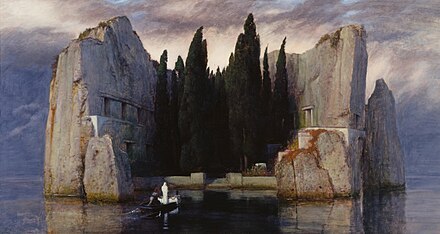
ISLE OF THE DEAD (1883) by ARNOLD BÖCKLIN
The painting depicts two figures, one oarsman, the other a woman in white rowing a small boat on an island. The shape at the head of the boat can be interpreted as a coffin. The island itself is covered by a cypress grove with many crypt doors carved into the rock
The strength of this image can be attributed to its thematic as well as stylistic complexity. The origin of the scene can be traced back to GREEK mythology. The oarsman can be seen as CHARON, the ferryman of HADES, who carries his passengers over the River STYX to the underworld.
In addition to the ENGLISH CEMETERY, several real-life models have been proposed for the island. These include ST. GEORGE ISLAND, MONTENEGRO. The rich colour and grandeur of the landscape are heavily inspired by GERMAN ROMANTIC landscape painting.
The painting gained immense popularity in the late 19th and early 20th centuries in GERMANY and found its way into the homes of many bourgeois families. With the painting’s focus on natural beauty and the dignity of the dead, it’s no surprise that it also expressed GERMAN NATIONALISM.
The painting’s most famous owner is ADOLF HITLER, who bought it in 1933 and hung it in his successor REICH CHANCELLERY, ALBERT SPEER. Despite its political connotations, the painting’s mysterious appeal has endured, and it remains popular in post-war Germany.
2 notes
·
View notes
Text
Un Sturmbannführer sueña Thule bajo el acueducto romano

Lorenzo Luengo
Dentro de lo que podríamos llamar una historia basura —aquí sin voluntad peyorativa— del siglo XX, compuesta a partir de los escombros, ruinas y desperdicios de los sucesos que podemos considerar “reales”, Heinrich Himmler hizo algo más que prestarle su cara de muñeco a Arnold Toht, el pequeño Sturmbannführer que literalmente se derretía por apoderarse del Arca de la Alianza en una conocida película americana. Según esa versión posthistórica de la historia, Himmler fue un inveterado esoterista que se rodeó de pasmados echadores de cartas y locos de la alquimia, la astroarqueología y, ya puestos, la fabricación de homúnculos con fines sumamente pintorescos, que abarcaban desde la búsqueda en el Tíbet de la ciudad perdida de Shambhala (y de la puerta inencontrable que comunica nuestro mundo con la Tierra Hueca) hasta el contacto con extraterrestres, dioses primigenios o divinidades babilonias en escenarios altamente novelescos. Planificó desde una supuesta “oficina de ocultismo” nazi el diseño, desarrollo y construcción de platillos volantes. Recuperó la Lanza de Longinos y el Santo Grial. Sus expediciones por el mundo tenían como finalidad localizar los centros de energía del planeta y servirse de ellos para proporcionar al Tercer Reich un extra de vigor cósmico que lo convertiría en el Reich de los Mil Años, y a Hitler en un inmortal revestido de poderes sobrehumanos y música de Wagner. Nada de eso aparece, naturalmente, en este libro sensacional y erudito, ameno y formidablemente documentado.
Lo cierto es que Himmler, como muchos de los principales dirigentes nazis y buena parte de sus seguidores y correligionarios, era un hombre muy culto. Sus viajes por el mundo, casi siempre con propósitos geopolíticos (sin ir más lejos, su visita a Madrid en 1940 para planificar junto a Franco y Serrano Suñer la entrevista con Hitler en Hendaya), él los convertía en pretextos para conocer museos, catedrales y tumbas de cadáveres históricos. Obviamente era, antes que nada, un hombre al servicio de una visión y como tal sus preocupaciones concernían principalmente a la construcción de un nuevo mundo, pero de alguna manera supo hacer coincidir esa preocupación con sus propias inquietudes de fanático constantemente sacudido por un misterio existencial, que en su caso provenía de haber formado parte alguna vez, bajo la apariencia de los ancestros, de una civilización superior y lamentablemente perdida. Rastros de esa civilización podían encontrarse todavía en muchos lugares del mundo: Irán, el Tíbet, Islandia, los paisajes alemanes, los cementerios de los reyes visigodos, las extrañas estatuas submarinas y las pirámides sepultadas bajo las Islas Afortunadas. Para recoger y estudiar toda esa historia perdida inventó su propio departamento en las SS al que dio el nombre de Ahnenerbe, o “la herencia de los antepasados”, una especie de museo monstruoso —en el sentido etimológico del término pero también en su acepción aterradora— en cuyos pasillos podían cruzarse eximios lingüistas y botánicos con médicos de batín ensangrentado. Ese departamento era como un punto aleph de la experiencia humana: allí se entremezclaba el resplandor que provenía de nuestra perdida edad dorada, cuando aún éramos como dioses, con los gritos de los torturados al servicio de la Ciencia (gritos que, no sé si asombrosamente, iban a encontrar un eco soterrado en el futuro.)
Inicialmente, la Ahnenerbe, concebida entre los años 1933-34 aunque materializada en 1935, dos años después de que el Partido Nacional Socialista llegase al poder, se ocupó de investigar ese legado racial y tradicional —entendido como el contenedor de un espíritu común y una gran conciencia colectiva— de la moderna Alemania. Himmler puso al frente de la Ahnenerbe a individuos interesantísimos por ser a un tiempo extremadamente cultos y extremadamente retorcidos —Walther Wüst, quizá no tan retorcido como otros, continuó el camino abierto en el siglo XIX por Wilhelm Schlegel y destacó como indólogo, con la tarea añadida de proporcionar una justificación científica a la “visión aria del mundo” —quien quiera conocer los orígenes modernos de la ciencia como religión de las oligarquías, las (sedicentes) democracias occidentales y los (sedicentes) buenos ciudadanos, puede empezar por aquí—, más allá de que se le conozca por haber estado directamente involucrado en la detención de los hermanos Scholl, aprovechando su labor como rector de la universidad de Munich—, algunos de los cuales terminaron sus días ejecutados o muertos por su propia mano.
Teniendo en cuenta que la misión de hombres como Wüst —que murió de viejo pero en el ostracismo— o Wolfram Sievers, el coleccionista de esqueletos y futuro ejecutado en el Juicio de los Médicos, era algo aparentemente tan poco peligroso como demostrar la existencia de una civilización germánica, similar a la civilización grecorromana que, por otra parte, Hitler admiraba mucho más de lo que le interesaba la mitología aria de Heinrich Himmler, sorprenden un poco esas muertes violentas. Pero se entienden mejor cuando las vemos enmarcadas lejos de las definiciones apriorísticas: la ciencia que debía sustentar las actividades de la Ahnenerbe (y que abarcaba disciplinas tan variadas como la música, la lingüística, la jurisprudencia, la pintura, el folklore y las ciencias naturales, con especial interés en investigaciones casi al límite mismo de la ortodoxia como las desarrolladas sobre zahoríes y radiestesistas para aprender a localizar manantiales y acuíferos) se alejó de los asuntos germánicos para ponerse al servicio de la guerra. Buena parte de los experimentos médicos que se llevaron a cabo en los campos de concentración más famosos por su trato especialmente bestial a los prisioneros tuvieron a miembros de la Ahnenerbe como adustos pero encandilados protagonistas. No sólo por eso la Ahnenerbe fue considerada una sociedad criminal: en su condición de oficina dependiente de las SS estaba condenada desde el momento en que Alemania perdiera la guerra, y sólo quienes escaparon por la vía del suicidio o por la “ruta de las ratas”, con la venia no siempre involuntaria de la Iglesia Católica y Cruz Roja, se libraron de unos juicios que por razones más de inmediato presente que de pasado aún están a la espera de una nueva edición.
La Ahnenerbe estuvo a punto de contar con una sucursal en España, como relata en este libro —una obra a la que mueve la pura pasión, y a la que acompaña una impresionante documentación gráfica— el estudioso Alberto Javier Nicolás, si el entonces gobernador civil de Málaga y más tarde ministro-secretario general de FET y de las JONS, y aún más tarde ministro de Vivienda, el arquitecto José Luis Arrese, hubiera contado con mejores medios para salirse con la suya. Arrese no vio llegar el dinero que hubiera permitido la fundación de la Ahnenerbe española —y eso en el caso de que Franco hubiera dado su aprobación al proyecto, cosa dudosa—, y tuvo que conformarse con la colaboración de la oficina alemana en la limpieza, recuperación y catalogación de unas reliquias desenterradas en Castiltierra (Segovia), procedentes del mayor cementerio visigodo localizado en Europa y extraviadas en su viaje de regreso a España (enmarquemos de recelosas comillas ese extravío).
Himmler no podía dejar de interesarse en las reliquias visigodas y pidió visitar Castiltierra durante su viaje a España. Antes había visitado las pinturas del museo de San Telmo, la catedral de Burgos y la tumba del Cid, y el alcázar de Toledo acompañado del general Moscardó. Más tarde volaría a Barcelona para visitar Montserrat, la Monsalvat del Parsifal de Wagner, con sus peligrosas estribaciones hacia el lado meridional donde se alzaba el castillo encantado de Klingsor, la perdición de los necios que buscaban el Grial: y allí, en la biblioteca del monasterio, donde fue muy bien recibido por los monjes, Himmler preguntó por el Grial, del que nadie le supo dar información (no mucho después enviaría a uno de sus hombres a la prodigiosa tarea de buscarlo), y antes de partir se fotografió con la Moreneta. Para entonces ya había pasado por Segovia, había comido en Cándido, había “excavado visigodos”, como escribió en un estilo siniestro de tan económico el arqueólogo Pérez de Barradas —“Por la tarde, Julio me propone que vaya a Castiltierra a excavar visigodos para la visita de Himmler”—, y había escuchado con encandilado interés la historia de las momias guanches, de cabellos rubios y elevada estatura, desenterradas en las Islas Canarias. ¿Atlantes, antiguos habitantes de otro pueblo mítico: Thule? Fuera como fuese, la Ahnenerbe no podía dejar de excavar también en Canarias, donde se intentó localizar un ídolo femenino en forma de columna, la Weltsäule, el “eje, pilar o columna del mundo atribuido a la cosmogonía guanche”, que para los arqueólogos alemanes estaba vinculado a la Irminsul nórdica, la columna que comunicaba el cielo con la tierra venerada por los sajones y que, según se cuenta, acabaría siendo talada por Carlomagno. (Por cierto, el Julio al que alude Barradas en su diario era un individuo bastante peculiar, Julio Martínez Santa Olalla, arqueólogo formado en Alemania y necesario protagonista de este libro; un tipo “alto, rubio, muy miope, en general bueno con sus alumnos y áspero con sus colegas, que le tenían antipatía. Hablaba de una manera irónica, desdeñosa y lánguida a la par”, según la descripción de Julio Caro Baroja, y que, con toda su nonchalance y su arrogancia —y la “corte de discípulas que lo admiraban”—, llegó a sorprender a Himmler con su alemán casi perfecto. Entre los 22 y los 25 años había sido profesor en Bonn, admiraba a Mussolini, y de regreso en España estuvo a punto de ser fusilado en la Checa de Fomento, algo que habría ocurrido inevitablemente de no haber intercedido en su favor Julián Besteiro. Años más tarde Santa Olalla —que a causa de su filonazismo acabó siendo un apestado en el régimen franquista— sería uno de los delatores de Julián Marías.)
Si es verdad que siempre ha despertado una fascinación generalizada toda esa mística nazi de los intereses arqueológicos, los enigmas históricos, la parafernalia romana y los uniformes de Hugo Boss, esa fascinación resulta aún mayor cuando la mística se distancia de los tópicos y aparece de pronto en escenarios tan poco susceptibles, en principio, de acoger ni una pequeña historia del nazismo como el restaurante Cándido o los sembrados segovianos donde fueron sepultados siglos atrás unos príncipes visigodos. Lugares cercanos a nosotros, dueños de otras connotaciones, que de pronto realzan su propia historia. ¿Entonces es verdad que aquí, bajo un monumento levantado antes del nacimiento de Cristo por un puñado de soldados romanos para canalizar el agua de unas montañas lejanas, en este mismo empedrado irregular, se escuchó taconear las botas de Heinrich Himmler? ¿Ocupó el pequeño Sturmbannführer —no tan pequeño, en realidad—, en el restaurante de la esquina, una de las sillas que ahora ocupan turistas franceses o americanos? Ya sé que estas preguntas no añaden nada al relato suficientemente fabuloso que nos cuenta Alberto Javier Nicolás, pero suman esquinazos y jardines a una historia que creíamos suficientemente conocida. Me quedo, no obstante, con las palabras mucho más serenas y terrenales de su autor, que se ocupan, como colofón a una tarea francamente descomunal, de lo que de verdad es relevante:
Este estudio ha pretendido relatar esos hechos transcurridos en apenas cinco años, enmarcándolos en torno a la figura del arqueólogo burgalés Santa Olalla. Su declive, producto del devenir último de la guerra mundial, le pasó la consiguiente factura, pero es indudable que su labor fue enorme. Quedan aún varios flecos historiográficos por contar… preguntas y respuestas que futuros investigadores pueden y deben continuar planteándose. El puente levadizo está echado.
O, dicho en otras palabras, esa historia tuvo lugar, y hasta donde ya hemos llegado —que no es poco—, merecía la pena ser contada.
—————————
Título: La Ahnenerbe en España. 1940-1945. Autor: Alberto Javier Nicolás. Páginas: 290. Editorial: EAS (2021). Venta: Todostuslibros.
1 note
·
View note
Text
The Great Fire
ROBERT REICH
JAN 11

Friends,
The following is the best account I’ve read of the fire that’s consuming Los Angeles. It’s from Steve Schmidt’s substack, The Warning. (steveschmidt.substack.com.Getty Images
Like the Great Fire of London in 1666, the Great Fire of Los Angeles will be recalled for 500 years.
The scale of the conflagration is biblical. These epochal fires will join Chicago and San Francisco atop an infamous registry of American destruction.
The fires are still spreading, still growing. There is no precedent, and no similar event by scale, cost or damage that has ever occurred in America. None.
The “Big One” came, but it wasn’t an earthquake that triggered the inferno, it was January winds that brought with it a storm surge of fire.
The worst case scenario has arrived, and don’t let anyone tell you that it was unforeseeable.
The conflagration was entirely predictable, and ultimately, inevitable. In fact, it was destiny. I don’t say that lightly.
The winds have brought Armageddon, and a brutal judgement upon the genius and arrogance of mankind’s building on a Garden of Eden, tempting the wrath of creation.
This is why I have written about Titanic so often. The lessons are enduring — even if the learnings have been fleeting.
There is an old saw about what starts in California ultimately spreads to every corner of the United States.
There is a lot of truth to the saying.
Consider the immense technological, cultural, and legislative invention that has come from the Golden State. The state is home to 39 million Americans. Its economy ranks fifth internationally, behind the US, China, Germany, and Japan. On a per capita basis, California's GDP is greater than that of all of these countries.
I love California, and have from the second I first set foot there more than 30 years ago.
Among the great good fortunes of my life is that I have lived in California for many years, and have explored every part of it. My political career has brought me to nearly every town and ghost town in the state. I ran Arnold Schwarzenegger’s 2006 re-election campaign for governor — the last time time a Republican was elected to that office. That was almost 20 years ago.
There is no other place like California in the world.
Her beauty is as magnificent as her dangers are deadly.
It has become fashionable in recent years to bash California. The state’s governance has become a punchline, a caricature and a MAGA war cry. Among the great grotesqueries and stupidities of our time is the sheer number of MAGA politicians who openly disdain the nation’s economic, technological, social, cultural, and innovation furnace. There is no scenario in which America succeeds with a failing California. Only an imbecile would root for California to fail or burn, and tragically, there is no shortage of fools in America rooting for both.
California is a mythological land. It is a place of sublime beauty and deep complication. It is the most complex state in the most complex nation in the history of the world. It is a place where one political party rules.
One party rule breeds corruption, incompetence, mediocrity, arrogance, entitlement and delusion. Of course, the California Republican Party has long been a collection of cranks, conspiracy nuts, ideological clowns and oddballs who prefaced the rise of their federal brethren.
California is a place where MAGA holds zero sway. There are 60 Democrats out of the 80-seat State Assembly, 30 out of the 40 State Senate seats. There are eight elected statewide officials, and every single one of them is a Democrat. These are epic supermajorities.
Sacramento isn’t Washington, DC, nor is it a proxy front in the MAGA drama produced by corporate media mandarins who ignore western state issues like fire, water, and drought with as much determination as they ignored the opioid crisis and fanned Trump’s rise.
The recriminations are just beginning in California. They will get much worse because what will become clear is that the failures were epic, systemic, plain as day, completely ignored, wished away, and left to build until the instant of catastrophe.
Everything will change in California after the fires, and everything will stay the same. This tension will upend the state’s political establishment, and destroy the line of succession that has taken root during the term limits era.
A succession of mediocrities — each a political careerist — has bounced from office to office for an entire generation doing nothing but ignore growing problems, while seeking elevation to the next office.
The initiative and referendum process will be abused by political profiteers, while corrupt recovery deals proliferate like the deadly conflagration exploded.
Recovery profiteers will seek fortunes, while politicians plot for attention and advancement.
The charred wasteland will become a battlefield on which competence and incompetence will meet in daily battle. Insurance companies will deny claims saying that it was a wind event, not fire, that burned down 10,000 structures. The ordinary family devastated in a biblical fire is about to become a lonely pawn in a vicious game of musical chairs where paying out is the sucker’s move.
There are devastating, brutal days ahead for so many people.
Yet, this time there is a difference.
Southern California television news has long abhorred substance and seriousness. Politics and government were treated like genital sores by TV news executives for 40 years, as they covered freeway chases and all manner of stupidity, while the clock ticked down, while the fuse burned down. The story of the Great Inferno is the story of “The Looming Tower.”
This did not have to happen, but it also could not be stopped. It could not be stopped because nothing could stop people from building in the most beautiful places anyone had ever seen once the first thing structure was built there.
There has always been a precariousness about California, an impermanence.
When the ships came through the Golden Gate during the Gold Rush, there were so many of them they were abandoned. They became the ground fill on which the Marina district in San Francisco rose. It has crumbled, burned, and been rebuilt more than once.
There were 160,000 in California before the discovery of gold. Five years after the US Civil War there were 560,000 Americans, and by the beginning of the roaring 1920s there were 3.4 million. The count was 10.6 million in 1950, and 34 million in 2000.
The people kept coming. They kept coming and coming and coming until there were more than 39 million by 2025 when it all burned down.
The scale of the environmental disaster will dwarf the damage caused by the 9/11 clean-up. The pollution is toxic, cancerous and deadly. The magnitude of the environmental crisis is almost impossible to comprehend.
It is hard watching people who have lost everything appear on television demonstrating unbelievable perseverance and grit, and declare that they will rebuild. Some will, but the truth is that many will not, and should not.
This is going to be the most expensive disaster in the history of the United States. The costs will beggar imagination and become multiples of the initial estimates of $160 billion in damage, but it is beyond that.
The scale of the disaster and the nature of fire as a destructive force has reduced vast swaths of the second largest metro area in the United States to ashes.
The age of hyperbole has finally yielded to a reality for which there are truly no words.
What can be said?
The California political class seems to be mostly going with, “Who me?” which is always the awful predicate to, “Why me?”
For the uninitiated, let me introduce you to the LA City Council. Though the story is old, the machine remains.
America’s cities were spared the type of destruction that reigned down on European and Japanese cities like Tokyo 80 years ago. There is no modern frame of reference for an event like this occurring in a modern city anywhere in the world.
Vast parts of Los Angeles have been reduced by different means to what Tokyo was by firebombing.

Tokyo after the 1945 firebombing (USAF)
When the smoke lifts and the full sweep of the destruction can be understood it will boggle the American mind.
Then things will change.
Dramatically.
Donald Trump has talked at length about his revenge.
It has begun. It is underway. It is happening. Right now. It’s not in my head, and not in my imagination.
During the greatest crisis in the history of California en route to becoming the costliest natural disaster in American history, Donald Trump has offered snarling insults, veiled threats, misinformation and unrestrained malice.
He has used the disaster to attack the California governor, and has said nothing that matters of any consequence to the multitudes who are terrified and have lost everything.
Instead, like always, he has debased, inflamed and manipulated when he should have done the exact opposite. He seeks to gain from suffering, and incredibly, he doesn’t even bother to hide it anymore. More than anything else, it is this revelation from his chaotic transition that is most bone-chilling.
Our president is Arthur Fleck deep down.
Somehow he has concluded that a firestorm that has devoured a geography larger than Manhattan, and is only six per cent contained, is good for him. Donald has decided it proves him right about something — if only any of us could know what that might be. It certainly has nothing to do with his idiocies around the Delta smelt, a small fish that is the subject of controversy hundreds of miles away, as it has been for more than 30 years.
The capitulant Wall Street media should cover the dishonesty and incoherence of Trump’s inanity and insanity like the evil it is. Have no doubt, malice masks predation, and it is premeditated and purposeful. Trump looks at this disaster, and he sees one thing, and one thing only.
Opportunity.
He sees an opportunity to attack and weaken the enemy, which in his sick mind, is California.
The enemy is us.
Trump is happy today. Do you doubt it?
Over and over again, he has made clear what he wants to happen.
Trump despises California. He has made that clear enough.
Ten days from now, he will take command. What better way to pay back “Shifty Schiff” than by making his constituents suffer?
Why would anyone think anything else would happen?
In fact, just when California needs a mass deportation least, it’s going to get one.
It’s going to get it because common sense is in short supply around Donald Trump. Up in the thin air, where the stupid never takes a break, there will be no let up.
Delivering on this promise — long discounted by the media, which constantly asserts that he doesn’t really mean it and can’t possibly do it — he has been playing like Lucy does Charlie Brown for the last 10 years.
Nothing ever goes back.
Nothing burned to nothingness can be restored. Nothing.
The highrises built in Miami on the edge of the ocean are sinking into the sand. The waters are rising. The temperatures are becoming more extreme.
The hour long predicted has arrived.
It doesn’t make it any easier to watch.
2025 is off to a brutal beginning in these United States, and it is going to get worse.
Defiance will be required, and more than anything, the faith to maintain it.
Pray for California and her people.
0 notes
Text
Arnold Schwarzenegger Vermögen: Wie reich ist der Terminator-Star wirklich?

Arnold Schwarzenegger, auch bekannt als "Arnie", ist nicht nur ein berühmter Filmstar, sondern auch ein erfolgreicher Investor und Milliardär. Mit einer beeindruckenden Karriere, die vom Bodybuilder über den Filmstar bis hin zum Gouverneur Kaliforniens reicht, hat er sich ein beachtliches Vermögen aufgebaut. Dieser Artikel beleuchtet das persönliche Vermögen von Arnold Schwarzenegger, seine Investitionen, darunter Starbucks-Aktien, und seinen Erfolg als Unternehmer und Politiker. Wir zeigen, wie Arnie zu einem der reichsten Männer der Welt wurde und wie er sein Geld investiert hat.
Read the full article
0 notes
Text
Final Time Based Performance piece.
"I am the disco"
After a group crit with Siobhan and Jodie about ways of capturing perception, i realised that one of the best ways to communicate my passion is through the act of dance itself. I wanted to create a piece that contains the energy and seritonin i feel when i am in a club, dancing with the music and people i love.
For this piece I wanted to become the discoball i have been studying and emulate light and shadows. I wrapped myself in a holographic silver foil, to appear as a sculptured dress. I then used a UV light to capture the shining quality the foil contains and danced in my bathtub. I overlay videos i had taken from club nights and warped the audio to sound to a more synthy and unpredictable. The work of Contemporary dance choreographer Annne Teresa De Keersmaeker influenced this piece. Her view on the act of dancing to express abstract ideas and feelings made me think differently about movement and music. Allowing me to relax into world of detached relaxation. The contrast of her work consisting of blues and classical music with my electronic club dance shows the eevolution of music and genres.
Since these breakthrough pieces, her choreography has been grounded in a rigorous and prolific exploration of the relationship between dance and music. She has created with Rosas a wide-ranging body of work engaging the musical structures and scores of several periods, from early music to contemporary and popular idioms. Her choreographic practice also draws its formal principles from geometry, numerical patterns, the natural world, and social structures to offer a unique perspective on the body’s articulation in space and time.
From 1992 until 2007, Rosas was in residence in the Brussels opera house La Monnaie / De Munt. During this period, De Keersmaeker directed a number of operas and large ensemble pieces that have since been performed by repertoire companies worldwide. In Drumming (1998) and Rain (2001), both with Ictus contemporary music ensemble, complex geometric structures in point and counterpoint, together with the minimal motivic music of Steve Reich, created compelling group choreographies that remain iconic and definitive of Rosas as a dance company. Also during her time at La Monnaie, De Keersmaeker created Toccata (1993) to fugues and sonatas by Johann Sebastian Bach, whose music has continued to be a recurring thread in her work. Verklärte Nacht (both the 1995 version for fourteen dancers and the 2014 version for three) unfolded De Keersmaeker’s expressionist side, bringing the stormy narrative of Arnold Schönberg’s late romantic string sextet to life. She ventured into theater, text, and interdisciplinary performance with I said I (1999), In real time (2000), Kassandra—speaking in twelve voices (2004), and D’un soir un jour (2006). She highlighted the use of improvisation within choreography in tandem with jazz and Indian music in such pieces as Bitches Brew / Tacoma Narrows (2003, to the music of Miles Davis) and Raga for the Rainy Season / A Love Supreme (2005).
https://www.sadlerswells.com/whats-on/anne-teresa-de-keersmaeker-rosas-exit-above/
youtube
0 notes
Text

This is one of my favorite photos from history.....
U.S. Army Chaplain Manuel Poliakoff (center) assisted by PFC Arnold Reich and Corporal Martin Willen celebrating Purim in March of 1945 at the former home of German Propaganda Minister Joseph Goebbels (without permission, of course). Goebbels's house was taken over so quickly that the trappings of Nazism had not yet been taken down. This photograph was published in Yank Magazine, but it's not known if Goebbels (or his boss) ever saw it or heard about it. Three weeks later it happened again, as Jewish GIs packed the house once more, this time to celebrate Passover. Purim is an ancient Hebrew holiday commemorating the salvation of the Jewish people from a ruler who schemed to kill all the Jews in the Persian Empire.
Historia Obscurum
#WW2#Purim
367 notes
·
View notes
Text
Pierrot Lunaire, Op. 21 (Arnold Schoenberg) - São Paulo, 14/setembro/2024
Obra completa com legenda em português: link.
“Três vezes sete poemas do ‘Pierrot Lunaire’ de Albert Giraud”, conhecido como “Pierrot ao luar”, Op. 21, é um ciclo de canções composto por Arnold Schönberg em 1912. Baseado em 21 poemas do ciclo de 50 poemas homônimo escrito pelo simbolista belga Albert Giraud.
Neste ciclo de canções fala-se da própria poesia, da poesia embriagada pela lua, da dor, do sangue, também da alegria, da colombina, de uma flor, da lua doente, da noite, de sorriso, de amores, de nostalgia, de maldade, de nostalgia, da canção. Mas não é exatamente um Pierrot que conta essa história, é uma voz feminina que aqui aparece, que é Pierrot, é colombina, a poetisa, você, eu, o juízo e o não juízo. O poeta incompreendido busca por significado de amor, vida e arte. Pierrot traz a ideia de um ser solitário e incompreendido e também sonhador que vive no reino das próprias fantasias. E quem não fantasia?
Pierrot é o palhaço triste, eternamente apaixonado pela Colombina que o trai com Arlequim. Entre os simbolistas e decadentistas, Pierrot se tornou uma alegoria do poeta sonhador, solitário, incompreendido e rejeitado no amor, tendo como única companheira a Lua. O tema principal dos poemas de Giraud, tema caro aos românticos a partir do Tristão e Isolda wagneriano, é a dicotomia entre o reino do dia, banhado pelo Sol, e o reino da noite, dominado pela Lua. É este reino lunar o espaço interior, subjetivo de Pierrot, em oposição ao espaço exterior, público, do dia: a sociedade corrompida e iluminada pelo Sol.
Falamos de Wagner e não apenas em função da semelhança temática: Schoenberg vai continuar o trabalho que o mestre de Bayreuth apenas sinalizou, rompendo com o sistema tonal que entra em crise a partir do Tristão. Mas, em oposição à orquestração wagneriana, Schoenberg vai preferir um pequeno e inusitado conjunto de câmara.
Esta obra foi responsável por abrir caminho para a música atonal e por revolucionar o padrão romântico da música europeia, visto que a soprano não deveria recitar nem cantar a ópera, mas seguir o ritmo e a melodia indicados na partitura, subindo ou descendo a voz, em distância proporcional à posição das notas. O estilo de canto é o sprechgesang, o canto-falado (ou sprechstimme, voz-falada), algo entre o melodrama teatral, a declamação e o canto propriamente dito.
É comum considerar o escândalo de A Sagração da Primavera de Stravinsky, em 1913, como o marco fundador absoluto do modernismo em música. Mas a verdade é que o Pierrot Lunaire foi apresentado um ano antes, e desde 1907 Schoenberg escandalizava o mundo musical, com seus quartetos de cordas e sua Sinfonia de Câmara. A partir de 1923, com a publicação de suas primeiras obras dodecafônicas, mais do que apenas revolucionar a música, Arnold Schoenberg dará início a um processo que levará ao estranhamento entre a música contemporânea e o grande público, estranhamento que persistirá com o advento da música concreta e da música eletroacústica e levará ao rompimento quase definitivo. Este só dará mostras de recuo quando os compositores, percebendo o esgotamento das fórmulas da vanguarda acadêmica, retornam ao sistema tonal, como Arvo Pärt, e passam a se concentrar mais em questões rítmicas, como é o caso, por exemplo, do minimalismo de Steve Reich e Philip Glass.
- Wikipedia - Trailer - Notasmusicais.com - Informações desta produção
0 notes
Text
Una enmienda a la vanguardia
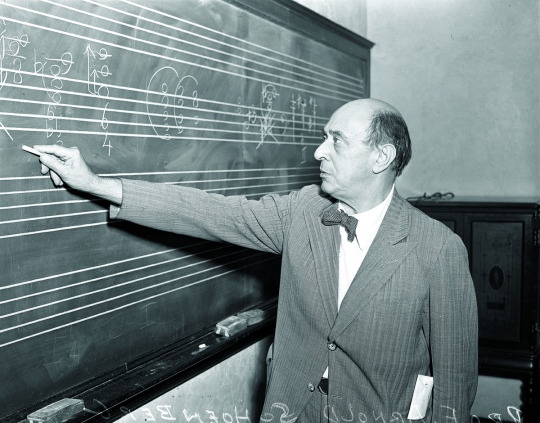
[Arnold Schoenberg dando clases en la Universidad de UCLA / ASUCLA]
El director de orquesta neoyorquino John Mauceri reivindica la música de los exiliados europeos en USA como la gran tradición clásica del siglo XX
A John Mauceri (Nueva York, 1945) muchos lo conocimos cuando en la década de 1990 participó como director en una serie que el sello Decca empezó a publicar con el título genérico de Entartete Musik (Música degenerada), en la que se pretendía recuperar la música de los compositores ridiculizados (y prohibidos) por los nazis en una famosa exposición con ese nombre (Düsseldorf, 1938) que era réplica de una anterior más importante sobre el arte pictórico (Entartete Kunst). Aquellos discos restauraron música olvidada de algunos compositores de notable reputación (incluidos Weill, Schoenberg, Zemlinsky o Hindemith) y la de otros reconocidos especialmente por su actividad en la música de cine (de Korngold a Waxman), pero sobre todo puso en valor nombres que eran por completo ignorados, incluso por los más eruditos: Hass, Ullmann, Krása, Schreker, Schulhoff, Krenek, Wolpe, Braunfels, Rathaus, Goldschmidt, Strassfogel...
La mayoría de estos músicos eran judíos: algunos murieron en los campos nazis; otros emigraron a los Estados Unidos. Mauceri considera que con ellos no se ha hecho justicia, pues las circunstancias políticas determinaron que, tras la Segunda Guerra Mundial, desde las más altas instancias públicas occidentales se privilegiara la más radical creación experimental, que rompía radicalmente con la tradición de la música clásica que estos compositores representaban, y este libro es una encendida defensa de la necesidad de volver a poner su legado en el centro del repertorio orquestal de nuestros días.
Esta consideración de la vanguardia de la posguerra como auténtica herramienta política había sido ya analizada por Alex Ross en su famoso bestseller El ruido eterno, en el que profundizaba en la ingente cantidad de recursos empleados desde el gobierno americano para fomentar una música que rompiera con la alta consideración que los alemanes tenían de su propia tradición, y ello como recurso de guerra psicológica para socavar su prestigio no sólo estético o intelectual, sino moral. Mauceri considera que lo que podría haber sido una experiencia meramente temporal se consolidó durante la Guerra Fría, ya que el nuevo enemigo era una URSS que también, como el Reich, condenaba las prácticas modernistas. La música se convirtió en un arma de combate. El apoyo oficial –y no sólo de los gobiernos, sino de entidades privadas y un ejército rocoso de intelectuales y críticos– se dirigió a las vanguardias emergidas de la posguerra en torno al serialismo (sobre todo, en Europa) y la indeterminación (en USA) rompiendo radicalmente la línea central de la evolución clásica. Eso se llevó por delante no sólo a la exitosa tradición posromántica, creada en torno a la escuela de Strauss y Mahler, sino también a la ópera italiana que culminó en Puccini, cuyos sucesores se vieron contaminados por el fascismo. El resultado es bien conocido: la fractura entre la nueva música y el público, atraído mayoritariamente por las corrientes de la música popular y muy alejado de lo que algunos pomposamente llaman música de creación (como si las canciones pop nacieran de las setas).
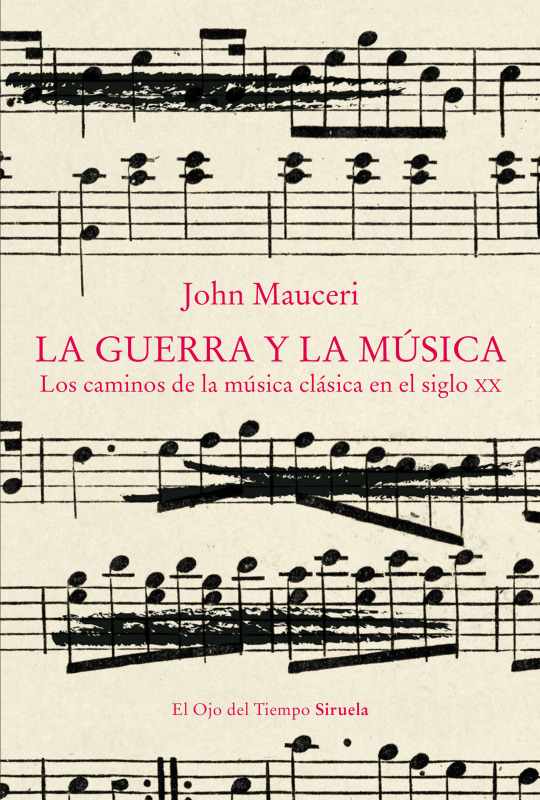
La ficha La Guerra y la Música. Los caminos de la música clásica en el siglo XX John Mauceri. Traducción de Lorenzo Luengo Madrid: Siruela, 2024 (edición original, 2022). 299 páginas. 26 € (ebook: 12.99 €)
En un breve ensayo que publicó también Siruela en 2003 (El alma de Hegel y las vacas de Wisconsin), Alessandro Baricco se lamentaba ya de que se hubiera quebrado la línea de Puccini y Mahler. Aquel texto de Baricco fue tildado en su día de polémico e incluso provocador. Y es que el discurso del dogmatismo vanguardista de los años 60 y 70 había llegado aún muy fuerte a finales de siglo. Hoy la arremetida de Mauceri contra la vanguardia de la posguerra –muy significativamente contra Pierre Boulez, al que, con razón, categoriza como el hombre más poderoso de toda la música clásica en el siglo XX–, es vista con absoluta naturalidad e incluso con una creciente simpatía en un medio musical cansado de lo que el director americano llama “eterna adolescencia” de la vanguardia.
La reivindicación de Mauceri va en cualquier caso un poco más allá. El exilio europeo en Estados Unidos, que incluía a Schoenberg, Korngold, Hindemith, Weill, Waxman, Rózsa, Steiner, Reiner, Walter... –¡y a Gershwin, Copland o Bernstein como emigrantes de segunda generación!– no sólo trasladó la tradición de la música de concierto europea a América, sino que creó una tradición original, la de la música para el cine, que no era otra cosa que la traslación de Wagner –al que considera el gran inventor de la música fílmica– a un entorno nuevo. Mientras la vanguardia oficial y sus altavoces mediáticos utilizaban el término “hollywoodiense” de forma despectiva y hacían música consumida en pequeños cenáculos de expertos, el gusto mayoritario se moldeaba con las creaciones épicas y conmovedoras que se difundían desde las pantallas, una música que Mauceri considera tiene –aunque no siempre, reconoce– poder autónomo y que debería figurar junto a las obras de concierto escritas durante décadas por los compositores tonales en los programas de las grandes orquestas internacionales. Y de hecho, aunque lentamente, eso es lo que está pasando ya: uno ve a la Filarmónica de Viena tocando en la Sala Dorada del Musikverein la Marcha Imperial de Star Wars bajo la batuta de John Williams en un concierto grabado por Deutsche Grammophon y entiende que los tiempos están cambiando. Mauceri apostilla: el gran reto de futuro (casi de presente) para los compositores está en los videojuegos y el carácter interactivo que se exige para su música.
[Diario de Sevilla. 11-08-2024]
youtube
0 notes
Text

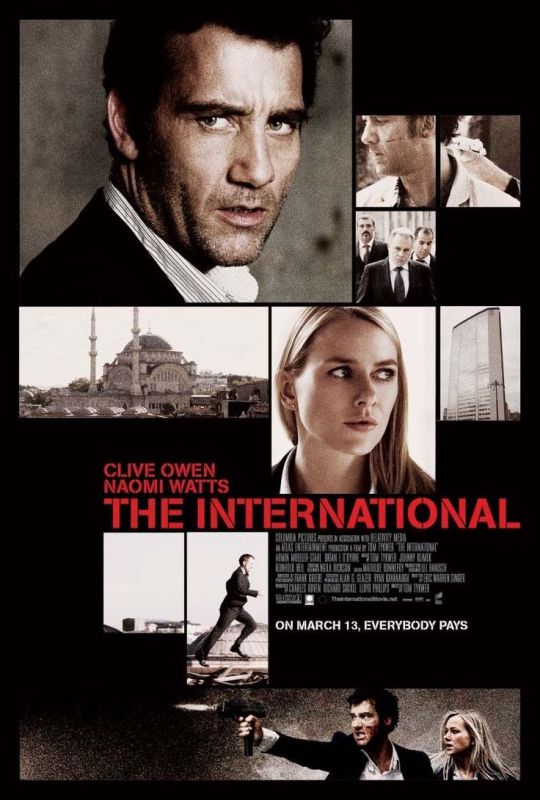


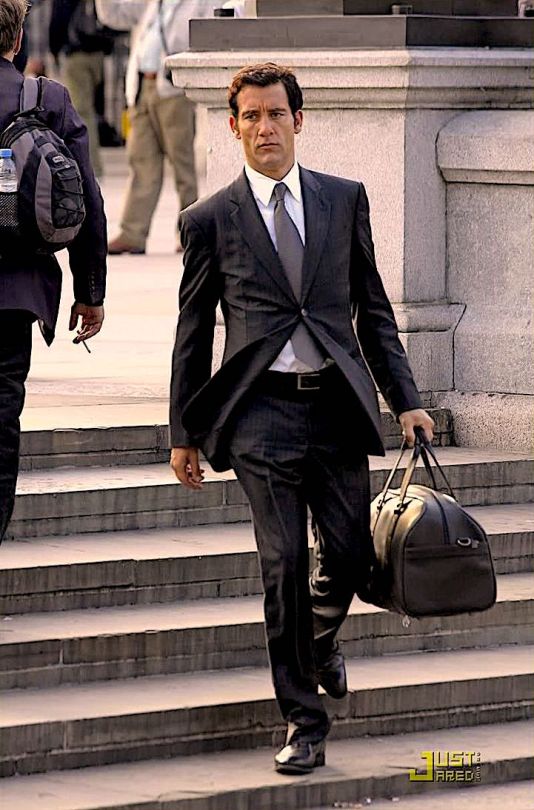

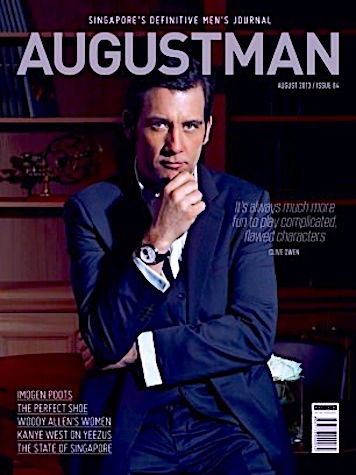

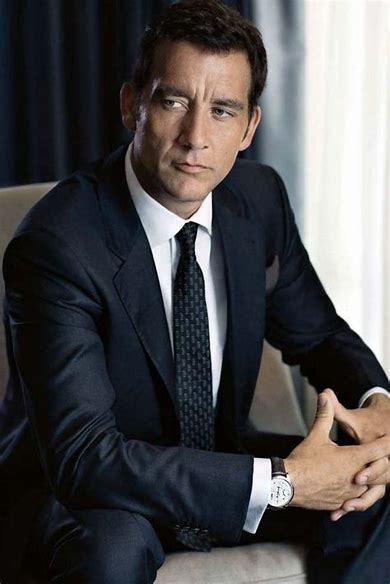

HAPPY BIRTHDAY to the 1990 unification of Germany, India Arie, the great P.P. Arnold, Dawayne Bailey, John Perry Barlow, Lindsey Buckingham, Ben Cauley (Bar-Kays), Chubby Checker, Eddie Cochran, Stephen Crane’s 1895 novel THE RED BADGE OF COURAGE, Frank Hannon (Tesla), Lena Headey, Pamela Hensley, James Herriot, Keb’ Mo’, Ju-hyuk Kim, Josh Klingenhoffer, Ronnie Laws, Tommy Lee, G. Love, Alan O’Day, Steve Reich, Madlyn Rhue, Kevin Richardson (Backstreet Boys), John Ross a.k.a. Chief Tsan-Usdi, Simone Segouin, Rev. Al Sharpton, Jake Shears, Ashlee Simpson, Shannyn Sossamon, Gwen Stefani, the 1962 stage premiere of STOP THE WORLD I WANT TO GET OFF, Billy Strings, Steve Tracy, Stevie Ray Vaughan, Jack Wagner, George Wein, Thomas Wolfe, Allen Woody, and the great, uber-successful, diverse, and prolific British actor Clive Owen. I wrote this tribute song on a whim one day and recorded it to utmost satisfaction with Bret Alexander and Ron Simasek of The Badlees. Fans of early psychedelia (think Yardbirds), spy movie music, and twangy guitars will dig this one. Meanwhile, God bless Clive and his family. Thank you for the quality cinema you’ve given us.
#cliveowen #britishactor #badlees #bretalexander #artrock #romance #johnnyjblair #singeratlarge #singersongwriter #sanfrancisco #ronsimasek #poprock #powerpop #earcandy #psychedelic #spymovie #twang #humor #urbanhumor
#johnny j blair#singer songwriter#music#singer at large#san francisco#pop rock#Clive Owen#birthday#British actor#Bandcamp
5 notes
·
View notes
Text
[Rezension] Die Arznei der Könige – Sabine Weiß

Klappentext: Ein stimmungsvoller, spannender Historischer Roman, inspiriert vom Leben der historischen Medica Jakoba die Glückliche Lüneburg im 14. Jh. Nach dem Tod ihrer Familie hat die junge Adlige Jakoba in einem Kloster ihre Bestimmung als Krankenpflegerin gefunden. Doch ihr Bruder zwingt sie in eine neue Ehe, und als ihr brutaler Mann einem Unfall zum Opfer fällt, muss Jakoba fliehen. Nur der Hilfe Arnolds, eines Theriak-Krämers, hat sie es zu verdanken, dass sie sich nach Paris durchschlagen und als Heilerin einen Namen machen kann. Rasch ist sie so erfolgreich, dass sogar der sieche König nach ihr ruft und nach der "Arznei der Könige" verlangt. Doch damit macht sie sich gefährliche Feinde ... Rezension: Eigentlich liebe ich es ja, in die Vergangenheit einzutauchen, aber historische Romane sind nun mal nie solche Bücher, die 100 -300 Seiten haben, sondern, wie auch in diesem Fall, mal locker über 600 Seiten lang sind und somit Zeit und Muße erfordern. Ein zusätzlicher Faktor kommt bei mir noch hinzu. Ich sitze auch immer wieder am PC und surfe, um mehr über die Zeit zu erfahren. Dies fängt mit der Gemeinde Dahlenburg zum einen an, und geht weiter mit Lüneburg im besonderen, zum Beispiel wollte ich mehr über das Schloss wissen, welches auf dem Lüneburger Kalkberg stand und 1371 zerstört wurde. Dass ganze Wälder um Lüneburg wegen den Salinen verloren gingen, war mir klar, auch dass der Adel, im Besonderen der Landadel, immer mehr verarmte, aber weiterhin auf seinen Stand pochte. Allerdings war mir nicht bewusst, wann dies schon einsetzte. Dies alles ist sehr interessant geschildert. Ihr merkt, ich könnte mich stundenlang über die verschiedenen Themen des Buches auslassen, auch über Klöster und deren Bedeutung, auch zur Versorgung der Bevölkerung mit Nahrung, aber auch, wie in diesem Buch oft erwähnt, im medizinischen Bereich. Klar bei vielen Dingen, steht man heute da und schüttelt den Kopf. Allerdings muss ich sagen, dass die Autorin es ziemlich gut hinbekommen hat, dies alles logisch aufzubauen, so dass es glaubhaft ist, wie Jakoba zu ihrem Wissen über die Medizin gekommen ist. Vor allem die Reise mit Arnold und Mona nach Venedig und die Zeit dort, kommen nicht zu kurz. Man erlebt wie diese 4-köpfige Gruppe immer mehr zusammenwächst und einige abenteuerliche Kämpfe erlebt. Man merkt schon am Tod von Mona, der Lebensgefährtin von Arnold, dass bestimmte Dinge einfach nicht zu heilen sind. Es ist fast eine kleine Westeuropareise von Lüneburg in die alles überstrahlende Stadt Venedig mit ihren Apotheken und wohl für damalige Zeiten herausragende Möglichkeiten des Handels. Allerdings sollte hier angemerkt sein, dass Lüneburg zur damaligen Zeit eine bedeutende und reiche Handelsstadt war. Ihr Salz war ein enorm wichtiges Handelsgut. Man sprach nicht umsonst vom weißen Gold. Wenn man das heutige recht beschauliche Lüneburg betrachtet kann man sich dies nicht so ohne weiteres als brummende Handelsmetropole des Mittelalters vorstellen. Dann geht es weiter nach Paris. Wohl eine der größten Städte der damaligen Zeit, mit ihrer Universität. Ich habe mich des Öfteren dabei erwischt, wie ich kopfschüttelnd über dem Buch saß. Aber es war damals so, dass Frauen weniger wert waren wie Männer und nur Männer die Möglichkeit hatten sich weiterzubilden – so sie denn genug Finanzen dafür hatten. Wenn man sich dann überlegt, wie lange dies eigentlich andauerte, kann ich nur noch mehr den Kopf schütteln. Von Paris ging es dann wieder zurück nach Lüneburg. Nebenbei kommt auch noch der Templerorden vor. Man erfährt so ganz nebenbei auch noch etwas über den Johanniterorden und dem Deutschen Orden. Und da bin ich dann wieder zu den Seitenzahlen. Am Ende sitze ich da und frage mich warum ein historischer Roman nur 600 Seiten hat. Mir kann man es einfach nicht recht machen. Auch wenn ich länger zum lesen brauche, will ich, wenn das Buch gut geschrieben ist, kein Ende haben. Manche Dinge, wie die Reise von Venedig nach Paris oder von Paris nach Lüneburg hätten noch etwas detailreicher beschrieben werden können, denn auf einmal ist das Buch fertig. Ab Seite 300 bis Ende war kein Zwischenstopp mehr möglich. Es war einfach zu spannend. Die Handlung überschlug sich fast. Dafür, dass eigentlich alles was wirklich über Jakoba bekannt ist, der Prozess in Paris war, kommt die Pariser Zeit fast schon zu kurz, was aber auch an der Dichte der Story liegen könnte und wie sehr sie mich gefesselt hat. Ein ganz wichtiger Bestandteil sind die Figuren. Die Personen, die Frau Weiß zeichnet, sind gut zu erspüren, auch mit ihren Ängsten und Nöten. Ich finde, dass sie eine schlüssige Geschichte rund um Jakoba geschrieben hat. Ich freue mich schon jetzt auf das nächste Thema von Frau Weiß und hoffe, ich bekomme es mit, denn Sie ist eine gute Geschichtenerzählerin, der ich die Leidenschaft angemerkt habe, wie sie den Roman geschrieben hat. Titel: Die Arznei der KönigeAutor: Weiß, SabineAltersempfehlung: ab 16 JahreISBN: 978-3-404-17646-5Verlag: Bastei LübbePreis: 13,00 €Erscheinungsdatum: 29. März 2018 Bei unseren Partnern bestellen: Bei Bücher.de bestellen. Bei Genialokal.de bestellen. Bei Hugendubel.de bestellen. Bei Thalia.de bestellen. Die Buchhandlung Freiheits-platz.de unterstützen! Die Büchergilde FFM unterstützen! Lesen Sie den ganzen Artikel
1 note
·
View note
Text
Brief List Avant-Garde Composers/Precedents for MFA
A list of composers Lysaker outlines as precedents for Eno's Music For Airports:
Claude Debussy (1862-1918).
Erik Satie (1866-1925).
Feruccio Busoni (1886-1924). Italian pianist "known for his editions and transcriptions."
Charles Ives (1874-1954), Busoni and Ives were both interested in microtones.
Arnold Schoenberg (1874-1951). Argued that "consonance and dissonance are not opposites, rather they are names for qualitatively different relations between all the tones in the chromatic scale."
Luigi Russolo. Italian. In 1913, writes, "Musical sound...is too limited in its qualitative variety of timbres." "We must break out of this restricted circle of pure sounds and conquer the infinite variety of noise-sounds."
Pierre Schaefer (1910-1995). Musique concrete, "radio engineer with philosophical sophistication, sought to develop a "discrete and complete sound object."
Edgard Varese (1883-1965). "Already in the 1920s Varese decided to call his music "organized sound" and himself not a musician, but "a worker in rhythms, frequencies, and intensities." See "poeme electronique (1957-58), composed "in response to an invitation from architect Le Corbusier (1887-1965). (What's the "tone poem tradition"?)
8. John Cage (1912-1992). Also sough to rethink music as "the organization of sound." is "more excited by the prospect of outlining *a situation* in which sounds may occur." "Cage blurs the distinction between the sounds of hte world and those of the work much as MFA does when it provides a 'tint' or 'atmosphere,' which Eno claims is its aim as an ambient work. Drawing inspiration from Satie's 'musical furnishings' and as a clear precedent to MFA, Cage's music tries to join the world rather than replace it for the time being."
9. Steve Reich (1936). Eno first encounters procedure of running tape loops in Steve Reich.
10. Alvin Lucier (1931). "Every room has its own melody."
11. La Monte Young (1935).
12. Terry Riley (1935). "Didn't abandon consonance, and this distinguishes him from most of the figures we've discussed. His most famous work, In C (1964), unfolds mostly in C major, a key almost prudishly avoided by most avant-garde composers...Riley is more interested in working with vibrations and their cosmic import than with keys and their historical significance.
0 notes